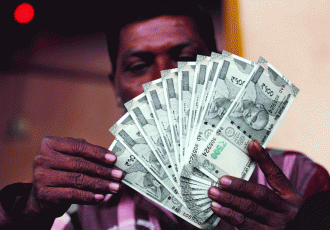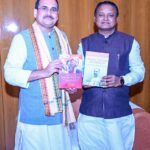TRACING HISTORY OF BLACK MONEY: PAST AND PRESENT
- By : Anirban Ganguly
- Category : Articles

Amit Shah’s point that the BJP has been fighting against black money since the days of the Jana Sangh has put many in the spot, especially the Congress, which allowed this practice and habit to grow
During a media tête-a-tête last week, BJP president Amit Shah publicly spoke of the need to eradicate the role of black money in electioneering. He argued that the demand made by the BJP today is not something new; it had been doing so since the days of the Bharatiya Jana Sangh. “What matters to us and towards which we wish to work is the eradication of the role of black money in our elections”, Shah said, without mincing words.
Naturally, such a stance has put a number of others in a spot — one can see the extreme manifestations of their discomfiture through a continuous theatrical performance, both inside and outside Parliament. The Congress is, perhaps, the hardest hit with such a stance; historically it is one party which has allowed this practice and habit to grow to gargantuan proportions. In fact Shah was right when he said that it was during the Congress rule that the nation suffered from the paralysis of black money and the process of demonetisation was a surgery that was required to free the nation from the clutches of such a debilitation.
It is perhaps after a long hiatus — the last ones who spoke passionately on the issue of tackling the role of black money in elections was perhaps Jayaprakash Narayan, C Rajagopalachari and Nanaji Deshmukh — that such a discourse is taking centre-stage and the president of the largest as well as the ruling party is seen talking in no uncertain terms on the need to neutralise this parasitical disease which is silently eating away at the crucial entrails of our democratic polity. This, in itself, is a heartening development and must be welcomed by all those who wish to see a true cleansing and reform of our election system gradually take place.
In fact, as early as 1959, writing to one of his private secretaries, Rajendra Prasad, then President of the Indian Republic, had expressed a deep concern of this growing trend of corruption and had hoped that someday someone would have the gumption to undertake drastic measures. “Are we really walking on mines which may burst any day?” he wrote, “I hear that people are freely talking about corruption, bribery, nepotism…” Prasad called for probe and a “drastic remedy”.
Prasad’s colleague and leader Jawaharlal Nehru, however, exuded ambivalence when it came to tackling corruption and black money. Over 15 years after he became the Prime Minister, Nehru astonishingly argued, “Corruption is… the result of the democratic process; and I am a little afraid that as this process grows, corruption is going down to the villages.” The authors of an assessment of Nehru’s premiership observe, “Surprisingly, Nehru’s Government found no means to bring to book black-marketeers, adulterators and others indulging in dangerous anti-social activities. In a democratic set up none expected Nehru to hang every black-marketeer from the nearest lamp-post [as he had once famously pledged to do], but if, in West Bengal alone, the Congress Government could between 1947-58 jail over “one hundred thousand people connected with the democratic movements of different sections of the people,” the country surely had the right to expect the Prime Minister to be equally ruthless towards corrupt and corrupting men.”
Towards the end of his life, Nehru’s ambivalence towards corruption had aggravated, in November 1963 he told his partymen that “the talk of graft and corruption in India is exaggerated” while the president of his party — at that point of time N Sanjeeva Reddy — had warned that the “organisation had lost its prestige because many Congressmen who, before independence, had been paupers had by now become millionaires.” Nehru immediately modified his stance, adding that “unless corruption was rooted out from every walk of life all talk of socialism would be meaningless.” Gradually the search for his socialist utopia led to the creation of a cronyism and kickback-based system where hoarding and black economy became the order of the day. His daughter did little to cleanse the system and, instead, reinforced and institutionalised the habit of graft and promoted cronies and did much to weaken the democratic system by often subverting the electoral process; her descendents further perfected that approach.
As early as 1961, Pandit Deendayal Upadhyaya had spoken of how a section with ill-gotten wealth was being enlisted in elections. “…A number of people are given tickets”, he pointed out, “for no other qualifications than their capacity to spend money. These people come in the field at election time and then hibernate for five years in the crowded bustees of Calcutta and Bombay. They do not come to the people to solicit their votes but to purchase them. They do not apply or qualify for the party ticket but purchase it. For them no price is too high. All that they want is to grease their way to the Parliament. For them it is a business deal…”
Shah’s point that this struggle against black money was not a new found cause by the BJP and that the party has been highlighting the issue of black money since the days of the Jana Sangh bears merit — at least activists and leaders with a sense of history will appreciate it. Those parties which have in any case lost their sense of history, their ideological moorings and have come to rely on the wisdom of imported academics and leaders, will scarcely internalise such an allusion.
In its first party document, released on its founding day on October 21, 1951, under Syama Prasad Mookerjee, the Jana Sangh referred to a “horde of problems” besetting India, both “internal and external, old and new, which instead of nearing solution after independence are daily getting aggravated…Its production is falling, black marketing and profiteering are rampant and charges of corruption and favouritism against the administration…” are growing.
Jana Sangh’s economic resolution, ‘Economic Situation in the Throes of a Holocaust’, in its April 1974 session at Ujjain, spoke unequivocally on the need to eradicate black money. “The Indian economy”, it noted, “is diseased, and present order of privileges, licences, black money, and quotas is suffering from incurable cancer. Nothing short of a major overhaul can reverse the unerring descent to disaster.” Proffering detailed suggestions, the resolution said, among other things, that “Currency should be demonetised to unearth present hordes of black-money.”
While the previous ruling dispensation was tight-lipped on this need and rapaciously and routinely indulged in scams, Prime Minister Narendra Modi took to serving the bitter brew that would start sweeping the system clean.

















